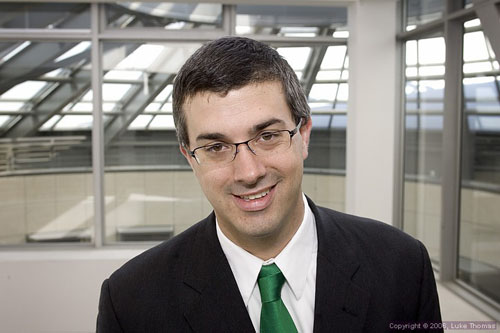
District 6 Supervisor Chris Daly. Photos by Luke Thomas.
By Chris Daly
Author’s Note: Please join us at 10 Years of District 6, the District 6 Symposium on Saturday, July 17th, between 10:30am and 12 noon at the Herbst Theater, 401 Van Ness.
July 15, 2010
“When it comes down to hardball politics that have changed the fabric of the city, it can be argued that the past 10 years have been the Chris Daly Era.”
Politicians thirst for personal accolades, and just about any one of them would swoon over that passage in The New York Times. But over the last decade in San Francisco’s District 6, the more honest analysis is that our many victories– on the ballot, at City Hall and in the neighborhoods– have not been about Chris Daly. Rather, our success has grown from the strength of our grassroots community and a true partnership between those in the trenches and those of us they elevated into the halls of power.
A Decade Ago
I arrived on San Francisco’s main political stage as a candidate carried in on the wave of a genuine people’s movement. The struggle for the soul of San Francisco had hit a crescendo in the Mission District with renters, artists, non-profits, and mom-and-pop shops pushing back against the forces of displacement and gentrification. Thousands of people took to the streets to claim ownership of our neighborhood. In City Hall, hundreds routinely mobilized and witnessed a Planning Commission and Board of Supervisors who cared more about their political contributors than they did an entire community. In organizing to save our neighborhood from a hostile takeover, the Mission Anti-displacement Coalition (MAC) and other neighborhood coalitions also effectively framed the politics of the day – everyday people standing up for their communities against reckless development and politicians with well-feathered pockets. With this frame, nearly every reformer with the support of MAC won election to the Board of Supervisors knocking out several Mayoral appointees in the process.
The Rise of Hotel Residents
My years spent organizing single room occupancy (SRO) hotel residents with the Mission Agenda leading up to MAC’s formation provided me more than just deep grounding, a grave sense of injustice, and a vision for a new truly progressive partnership. In neighborhoods like the Tenderloin and on 6th and 16th Streets that are so rich with residential hotels, it also provided us an electoral map. Never before had a serious political campaign spoken so directly to the issues facing those living in SRO hotels with hotel residents in so many key campaign positions. In 2000, the residential hotel political block had a serious coming out party, forming the heart of my volunteer effort and turning out to vote with previously unseen political discipline. In the intervening years, this political block played a central role in my 2002 and 2006 reelections and has also been a force in many other electoral efforts, especially initiatives related to housing justice.
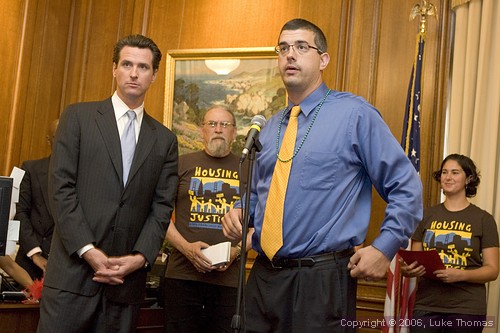
Supervisor Chris Daly sponsored legislation signed into law by Mayor Gavin Newsom, 8/11/2006, mandating developers make15 percent of their on-site units, or 20 percent of off-site units, affordable to moderate-income buyers and low income renters.
One of the very first pieces of legislation I introduced was to ban the charging of visitor fees and to enact a uniform visitor policy across the City’s SRO hotels. Not only was this one of the most dehumanizing and destabilizing practices in the hotels, the effort provided a convenient transition for hotel residents from the campaign to engage in the new politics of City Hall. Like the Miami Heat’s new starting line-up, progressives were able to field our own instant offense with Al Thompson, David McGuire, Jeoflin Roh, Tony Hester, and many others. Following wins on visitor fees and the sprinkler ordinance (which before our arrival was languishing in Supervisor Newsom’s office,) we moved to increase our district’s capacity to organize in the hotels by funding the new Central City SRO Collaborative and expanding the SRO Families United. Central City later brought the issue of hotel residents’ lack of mail service to my attention. Working together, we passed legislation to require that hotels install individual mailboxes for permanent residents.
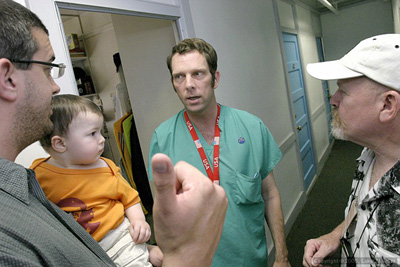
Supervisor Chris Daly with his son Jack pays a visit with SRO tenants Walter Paulson and h. Brown to discuss issues with visitation policy.
A New Bessie Carmichael
When I was first elected, one of the plainest examples of injustice in District 6 stood on the south side of Folsom. Bessie Carmichael’s bungalows were supposed to be temporary when they were placed on the site back in the 50’s. Walking into the school yard it was impossible to ignore how the bright art adorning the walls and spirit of the mostly Latino and Filipino students contrasted with the facility’s leaky roofs and drafty classes and tore-up bathrooms. The Bessie community, who had been asking for a new school for 20 years, saw promise after promise for a new school broken. In 1999 New Bessie Carmichael (NBC) formed to hold the School District and elected officials accountable and build community capacity in order to get a new school for the SOMA neighborhood. NBC was a regular fixture at School Board meetings and worked closely with me in my first month of office to put the City on record supporting a new school. The combination of direct community pressure, some coaxing from my office, and new progressive School Board members picking up the cause, a new Bessie Carmichael was approved early in 2002 and came online in 2004.
Given that the old Bessie sat on a parcel that was supposed to a new park for the South of Market, the new Bessie needed to be completed before the park could begin. Working with a broader group of SOMA stakeholders that included those at Bessie, we pressed the Department of Recreation and Parks and helped deliver the Victoria Manalo Draves Park in 2006.
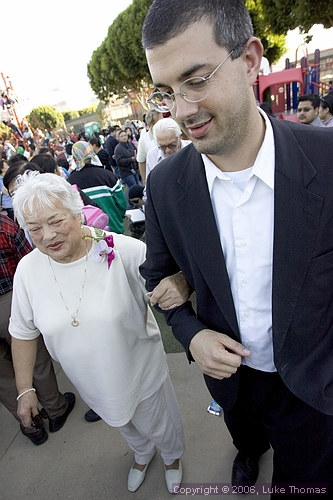
Supervisor Chris Daly honors olympian Victoria Manalo Draves (December 31, 1924 – April 11, 2010) during the opening of the park named in her honor, October 2006.
Saving Trinity
The real beauty of our District is in the diversity of our people — a precious diversity jeopardized by forces pushing working class people out of their homes and communities. During the last 10 years, nowhere was this issue more in the balance than at Trinity Plaza. A classic David versus Goliath battle, the Trinity struggle became the leading symbol of the fight to save the soul of the City.
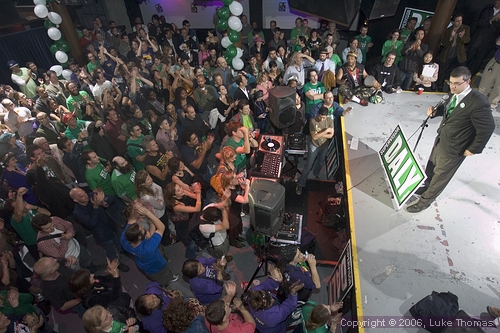
Saving the Soul of San Francisco: Supervisor Chris Daly takes to the stage at the DNA Lounge, November 7, 2006, in the heartland of San Francisco’s District 6 to announce a momentous re-election victory over big money and dirty politics.
On one side was Angelo Sangiacomo, a multi-millionaire landlord and real estate mogul pushing a fancy development project for the site. On the other, hundreds of working class residents and families led by a dozen tenant leaders who became unsung heroes of San Francisco.
In the 4-year fight over Trinity, the tenants suffered several setbacks. A Mayoral veto was upheld when a vote flipped in City Hall’s ornate Board Chamber. Then an initiative secured by thousands of summertime signatures was kicked off ballot in Superior Court due to a technical defect with the petition.
But the long-time residents of Trinity who came together for their community remained steadfast and vowed to continue their fight.
Ultimately it was a landmark agreement between Sangiacomo, the tenants, and our office to preserve all 360 rent-controlled units through the creation of a Development Agreement that served as the foundation for one of the most significant development projects in San Francisco history.
The first tower in the new Trinity Plaza is complete, and tenants from the old building have moved into their new homes at their previous rents. The final project will include up to 1900 units. Over 30% of those units will be below market rate, including the 360 rent-controlled units in the new building.
The Trinity struggle was epic and featured many Trinity tenants who brought their neighbors together to lead and inspire a citywide fight to preserve rent-controlled housing. This core community of tenants weathered years of struggle, setbacks, and personal adversity to deliver the Trinity victory. They represent the best of San Francisco and will forever be in hearts of those who struggle to preserve our diverse, working-class San Francisco.
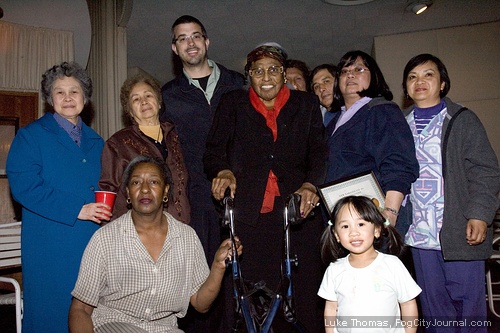
Supervisor Chris Daly was honored for his efforts to secure a deal with developer Angelo Sangiacomo over redevelopment of Trinity Plaza. The agreement maintains rent controlled units in a new building development, ultimately protecting tenants from displacement.
Making Development Work for Our Community
Growing out of their own neighborhood’s struggles around gentrification, the South of Market Community Action Network (SOMCAN) formed as a community organizing center for low-income residents, youth, seniors, and Filipino families in the South of Market. When the massive Rincon Hill development proposal, centered on luxury housing, started to gain momentum, SOMCAN approached our office to figure out if we could make the development work for the whole community. The answer was to create a community-controlled fund to mitigate the negative impacts of massive development that would be unaffordable to most neighborhood residents.
After intense negotiations between SOMCAN and developers, we reached agreement that $14 per square foot would be paid into the SOMA Community Stabilization Fund and another $11 would be paid into an infrastructure fund for the surrounding neighborhood. With the creation of a community advisory committee, the community would be able to direct the funds to pay for affordable housing and rental assistance, community open spaces, small business assistance and economic development, pedestrian and streetscape improvements, as well as community arts assistance and civic participation. The net result is that through a very close working relationship, we developed a plan allow for 2000 new housing units without displacement and set a high bar for subsequent development to provide significant community benefits.
Housing Justice
Many of our efforts over the last 10 years have focused on affordable housing, tenants rights, and homelessness. And fortunately, there are a wealth of community-based organizations and non-profit service providers that have long track records working on these issues in the district. Together with the Tenants Union, St. Peter’s Housing Committee, the Housing Rights Committee, and others, we pushed back against conversion of rental units into TIC’s. With Right to a Roof, Religious Witness with Homeless people, and others we passed the surplus property ordinance to get unused City properties as affordable housing sites for formerly homeless people. Together with non-profit affordable housing providers, we strengthened the City’s inclusionary affordable housing law and secured tens of millions of dollars from the budget for new affordable housing, including the first new community land trust in decades. With homeless advocates and stakeholders in the North Mission, we opened a new neighborhood resource center.
Each one of these victories came about through a partnership between genuine grassroots community efforts with political support from inside City Hall. And each was important in its own right. Several years ago, the principle activists from all of these struggles– affordable housing, tenants rights, and homelessness– came together to form the Housing Justice Coalition. This Coalition has sharpened the engagement with City Hall from the community side on all of these issues, building solidarity and lending support to one another, and forming a block to more effectively engage on more complicated issues like budget justice.
The Peoples’ Budget
Every year, the most important vote made at the San Francisco Board of Supervisors is on the budget. Now a $6.5 billion document, the budget defines what the City’s priorities are and is necessarily the intersection of every local issue. In the late 90’s a group of advocates and service providers that felt shut out started the Peoples’ Budget to more effectively engage in the budget process.
When I first took the Budget Chair in 2003, I wanted to open up the budget process to the People’s Budget and others historically shut out. My office doors were propped open, and much to the Clerk’s chagrin, we held five actual Budget Committee meetings out in San Francisco neighborhoods. In the process, we were able to redirect record monies to health programs including mental health, substance abuse services, AIDS/HIV programs, and homeless services. We also were able to continue to prioritize using our resources to ensure that the capacity of our civic engagement efforts was maintained and expanded.
Advocacy that started out as a document with recommendations to redirect monies within the budget now exists as an amalgamation of coalitions that practically take residence in City Hall during the Board’s budget month of June. The Family Budget Coalition, led by Coleman Advocates, Housing Justice, Local 1021, and health and human service advocates from the People’s Budget have worked directly with most Budget Committee members to hammer out details within the budget, including the once secretive “add-back” process. Perhaps more importantly, they form the foundation for the progressive approach in San Francisco, pressing for new progressive taxes and challenging downtown’s sacred cows in the management classes and Police and Fire Departments.
A Model Without Term Limits
The past decade has yielded many more victories that speak forcefully for a true progressive partnership. Paid sick days with Young Workers United. Transforming traffic on Market Street with the SF Bike Coalition. Prioritizing bus service with TransForm and Transit Justice. Adopting more stringent controls on air pollution with Greenaction and Communities for a Better Environment. Prioritizing housing production over parking with Livable City. Breaking ground on the Transbay Transit Center with the help of SF Tomorrow. And this is not even close to being an exhaustive list.
With my years of activism in the 90’s and roots deep in the community, I was sent to City Hall with a seismically more significant promise than, “Trust me, I won’t sell you out.” I was explicit that I would be carrying the movement with me into City Hall. While we may not have been able to literally melt the gold-leaf paint off the dome to give back to the communities that had so much taken from them, we did open the palatial doors to those who never before had a seat at the table. We also figured out ways to use our modicum of power to build the organizational capacity, coalitions, and vibrancy within our base communities. In doing so, we built an identity for District 6 based on true progressive politics– one that is strong, relentless, and, perhaps most importantly, truly empowering of those most impacted including those with the least among us.
Our activism inside City Hall and out hasn’t always been well-received. It is diametrically opposed to the historically dominant corporate politic and their swells on the hills. Sometimes it doesn’t even sit well with our would-be allies. But the fact remains that our true partnership and activism have developed and transformed progressive politics, which is now the largest political movement in San Francisco. Progressive politicians from other parts of the City now claim issues of economic justice, immigrant rights, health and human services, and affordable housing among their top priorities and consult with our base communities. Doors that were literally locked 10 years ago now stand open.
With my exit from the District 6 Supervisor seat, we have to make sure that our model for a true progressive partnership continues on.


 The Hunger Site
The Hunger Site
July 17, 2010 at 12:49 am
who is the next Chris Daly for my District 6? who will be THE go-to guy or gal who will immediately understand and act on behalf of economic and environmental justice? who is the candidate who will speak truth-to-power (and not just see where the wind is blowing at the moment)?
VERY BIG shoes to fill. Thanks for 10 great years Chris!
Rick H
July 16, 2010 at 6:13 am
Thanks, Luke, but I am hoping that tomorrow is a little more about our progressive coalition and little bit less about me. Given the cult of personality in politics, I know that is hard to do. But we will try nevertheless.
July 16, 2010 at 5:41 am
Bravo Chris,
You take away much swag from these years and deservedly so. We took away more, in the confidence and strength we gained through fighting with you.
h.
July 16, 2010 at 12:03 am
I truly hope the D6 Symposium will be viewed as an opportunity to honor Supervisor Daly and recognize him for his tireless activism and unbeheld independence in pursuit of social justice.
He may not have won the war against the established order, but he proved his capability and mettle and battled on bravely despite an onslaught of opposition arrayed against him.
For that, Chris Daly deserves our appreciation and our respect.
As h. Brown often says: political success is measured not by how many friends one has made, but how many enemies one has accumulated.
July 15, 2010 at 9:11 pm
Memories of the good fight. Jeoflin Roh. Hank Wilson. Sam Dodge. And many more.
July 15, 2010 at 7:00 pm
A very nice history and a lot to be proud of.
July 15, 2010 at 6:02 pm
I think you have demonstrated the difference between a true grass roots organizing campaign that begins with the community and a corporate-funded venture like Smart Reform. You have revolutionized the way politics is done in SF, and that’s a record to be proud of. Keep up the good work, Chris.